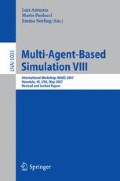Abstract
In an unpredictable, heterogeneous world, intelligent agents depend on accurate social information; reputation, among the preeminent artifacts to transmit social evaluations, has been receiving growing attention by social scientists. A realistic description of reputation must include inaccurate information; in this paper, based on the distinction between image (agents’ believed evaluation of a target) and reputation (circulating evaluation, without reference to the evaluation source), we model the spreading of information in a simple market with the presence of liars and the possibility of retaliation. While fear of retaliation inhibits the spreading of image, the detached character of reputation can be a cause of inaccuracy; The two forces could balance in different settings. In a set of simulations, with agents using the Repage platform for management of image and reputation, we compare the usage of image alone with the usage of both image and reputation. Reputation is shown to be preferable over image to allow for faster discover of scarce good sellers.
Access this chapter
Tax calculation will be finalised at checkout
Purchases are for personal use only
Preview
Unable to display preview. Download preview PDF.
References
Laffont, J.J.: The Economics of Uncertainty and Information, 4th edn. MIT Press, Cambridge (1993)
Kudenko, D., Kazakov, D.: Adaptive Agents and Multi-Agent Systems. Springer, New York (2003)
Kluegl, F., Bazzan, A.: A case study on the role of information for implicit coordination. In: AAMAS 2004 (2004)
Molnr, K.: Learning with expert advice. JEL (2006)
Hirshleifer, J.: The private and social value of information and the reward to inventive activity. American Economic Review 61(4), 561–574 (1971); In: P.A. Diamond, M. Rothschild. (ed.). Uncertainty in Economics: Readings and Exercises. Academic Press, San Diego (reprinted, 1989) ISBN: 0122148517
Carter, J., Bitting, E., Ghorbani, A.: Reputation formalization for an information sharing multiagent system. Computational Intelligence 18(4), 514–515 (2002)
Yamagishi, T., Matsuda, M., Yoshikai, N., Takahashi, H., Usui, Y.: Solving the lemons problem with reputation. An experimental study of online trading (2004)
Weesie, J., Buskens, V., Raub, W.: The management of trust relations via institutional and structural embeddedness. In: Doreian, P., Fararo, T. (eds.) The Problem of Solidarity: Theories and Models. Gordon and Breach 1998, Amsterdam, pp. 113–138 (1990)
Yu, B., Singh, M.P.: Detecting deception in reputation management. In: AAMAS 2003: Proceedings of the second international joint conference on Autonomous agents and multiagent systems, pp. 73–80. ACM Press, New York (2003)
Fullam, K., Barber, K.S.: Learning trust strategies in reputation exchange networks. In: AAMAS 2006 (2006)
Pradchayakool, P., Daengdej, J., Supannika, K.: An approach for detecting deception in agents. In: Aerospace Conference IEEE (2006)
Conte, R., Paolucci, M.: Reputation in artificial societies: Social beliefs for social order. Kluwer Academic Publishers, Dordrecht (2002)
Conte, R., Paolucci, M.: Social cognitive factors of unfair ratings in reputation reporting systems. In: Proceedings of the IEEE/WIC International Conference on Web Intelligence - WI 2003, pp. 316–322 (2003)
Sabater, J., Paolucci, M., Conte, R.: Repage: Reputation and image among limited autonomous partners. Journal of Artificial Societies and Social Simulation 9(2) (2006)
Miceli, M., Castelfranchi, C.: The Role of Evaluation in Cognition and Social Interaction. In: Human cognition and agent technology. Benjamins, Amsterdam (2000)
Sen, S., Sajja, N.: Robustness of reputation-based trust: boolean case. In: AAMAS 2002: Proceedings of the first international joint conference on Autonomous agents and multiagent systems, pp. 288–293. ACM Press, New York (2002)
Author information
Authors and Affiliations
Editor information
Rights and permissions
Copyright information
© 2008 Springer-Verlag Berlin Heidelberg
About this paper
Cite this paper
Pinyol, I., Paolucci, M., Sabater-Mir, J., Conte, R. (2008). Beyond Accuracy. Reputation for Partner Selection with Lies and Retaliation. In: Antunes, L., Paolucci, M., Norling, E. (eds) Multi-Agent-Based Simulation VIII. MABS 2007. Lecture Notes in Computer Science(), vol 5003. Springer, Berlin, Heidelberg. https://doi.org/10.1007/978-3-540-70916-9_10
Download citation
DOI: https://doi.org/10.1007/978-3-540-70916-9_10
Publisher Name: Springer, Berlin, Heidelberg
Print ISBN: 978-3-540-70915-2
Online ISBN: 978-3-540-70916-9
eBook Packages: Computer ScienceComputer Science (R0)

